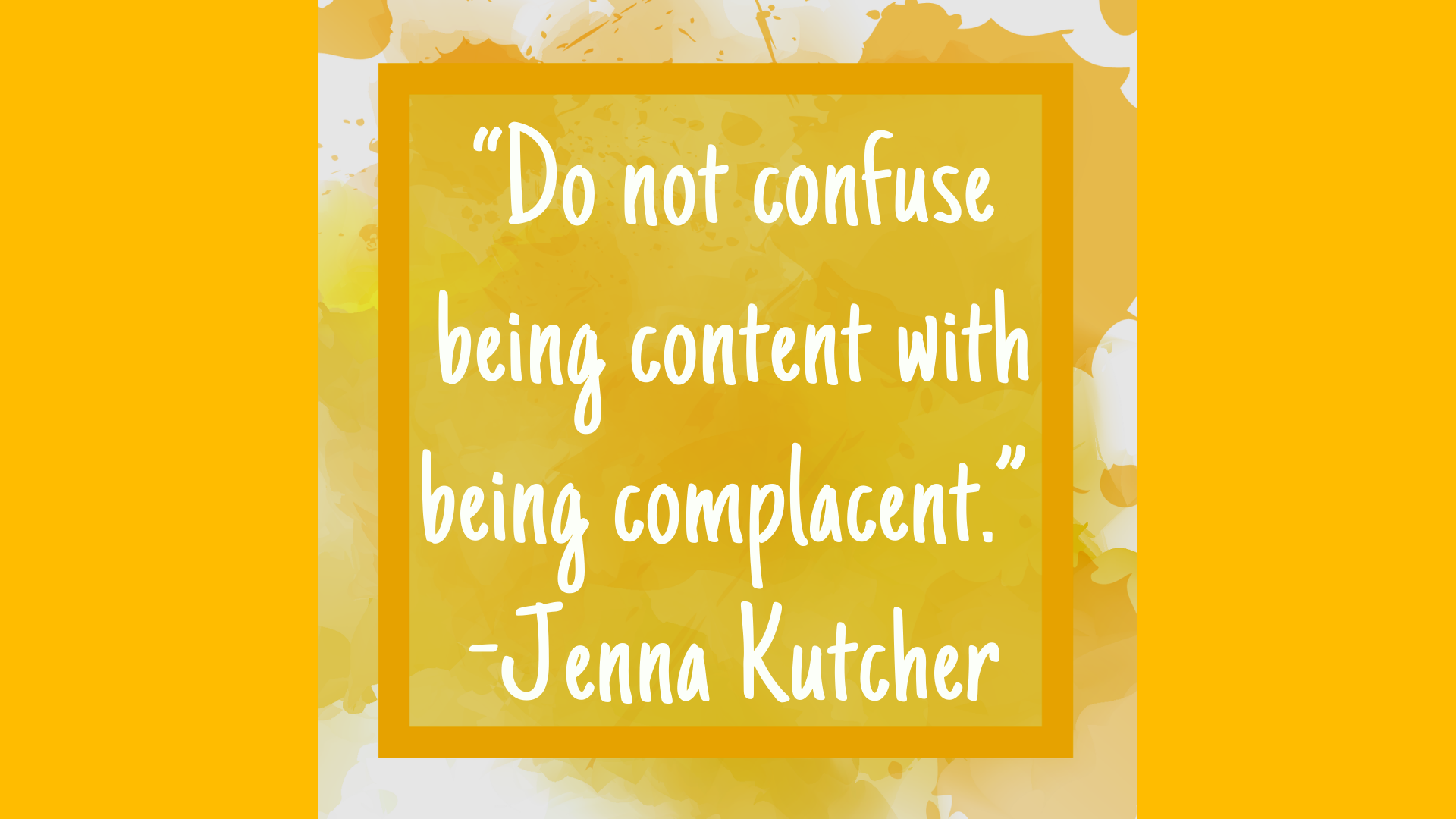Kay:
Boom, shacky-lackey Questers. Happy Terrific Tuesday, it is April 6th, and this is episode 327.
Shi:
Jenna Kutcher is our quest guide for today and she tells us, “Do not confuse being content with being complacent.”

Kay:
Now I had to read this one a couple of times because I wanted to just make sure I understood exactly what these two words meant. So, went and grabbed some definitions for you guys.
Shi:
The old Google.
Kay:
The old Google. So, you could be on the same page as us. So, the definition of content is a state of peaceful happiness.
Shi:
And the definition of complacent is showing smug or uncritical satisfaction with oneself or one’s achievements.
Kay:
Now those are two very different things.
Shi:
Definitely different.
Kay:
I think there is this idea that when someone becomes content that they no longer want to strive for anything further.
Shi:
Or I see this tendency to put these two words together like you become content and complacent. They must go hand in hand but they’re definitely different when we see that, you know, smug satisfaction versus peaceful happiness clearly indicating two different energetic signatures.
Kay:
One of the things that I kind of was thinking about in regards to the word content is that oftentimes we treat contentedness as a result like, “oh, I ate and now I am content,” or, “I did that thing and now I am content.” But if the content is a state of peaceful happiness, is that really a result or could we maybe be content without necessarily needing something to precede that contentedness?
Shi:
Oh, the rules we put on ourselves in order to feel contented or contentment.
Kay:
Contented.
Shi:
Contented. The rules can be vast, varied lengths, and changing and can change on a whim depending on how your mind is functioning that day and how it wants to allow you to either enter or not enter this state of peaceful happiness. I always think about Tony Robbins talking about he’s got 26 different companies with hundreds of employees and if his rule for being content is that everyone should be doing things the way he thinks they should be doing them and making decisions based on the way he thinks they should be making decisions will he ever feel contentment?
Kay & Shi:
No.
Shi:
Of course not.
Kay:
Of course, he wouldn’t, because you can’t guarantee that hundreds of people across dozens of companies are doing absolutely everything the way that you would want it done every single time. You just can’t do it because people are variable, just like circumstances, just like time things are variable. So, not getting confused here, I think it is really important now when we think about complacency, that’s smug or uncritical satisfaction with oneself or your achievement. So, I’m not willing to take a look at where I could improve. I’m not willing to say that maybe there was room for me to grow in that situation and I might not be willing to grow any further because I just think I’m so great.
Shi:
Complacent to me feels like that moment when you start a big project and you’re so energized by it like I’m going to reorganize the closet and you pull everything out and you’re organizing and you’re doing stuff and then you stop and have lunch and you text for a while. Then you’re like, “I mean I made pretty good progress,” (even though you still have all the shoes scattered about and you know that it’s going to take another half hour), but you feel good with how far you’ve gotten, and you want to let yourself off on finishing the project cause you’ve stalled out a little bit. So, you might become complacent with your results, but you’re definitely not content with the state of your closet.
Kay:
Well, if we were looking at the contentedness as a state, hopefully, you had peaceful happiness going on regardless of the state of your closet, but not allowing that complacency to sneak in and ruin your habits. Maybe that state of being that you’re looking to have that says, Hey, I want to be an organized person ultimately, at least in the Buddhist tradition, the idea of enlightenment is getting to the place where you are content without condition.
Shi:
I love that. Being able to be in love with life, be present in the moment, except for what comes your way. That doesn’t mean be a victim of what comes your way. It doesn’t mean take action. It doesn’t mean sit back on laurels, but it does mean that what is, is what is and that when you argue with reality as Kay, and I love to reflect on that you lose 100% of the time. So, really finding ways to be content without becoming complacent and not confusing the two as Jenna reminds us.
Kay:
And in this quote, Jenna Kutcher says, “Do not confuse being content with being complacent.”
Shi:
Alright, it’s your #TipTuesday Quest. On this Tuesday, we want you to reflect on what contentment versus complacency looks like for you through engaging in a vision activity. So, get yourself out a pen, and you’re going to draw two circles. In the first circle, write or draw what a content life would look like and feel like to you. In the other circle write or draw what a complacent life would look like and feel like to you then we want you to identify at least one action you can take today to attract more contentment into your circle. Are you ready?
Kay & Shi:
Let’s quest!




